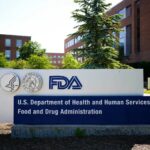By Lawrence Wilson
The federal Make America Healthy Again (MAHA) Commission released its strategy report on Sept. 9, setting the stage for dozens of initiatives aimed at improving the health of American children.
The strategy document was commissioned by President Donald Trump by executive order in February and builds on the commission’s May 22 assessment of the factors that are driving an increase in chronic illness among children.
“Thirty-eight percent of teens are now diabetic or pre diabetic,” Health Secretary Robert F. Kennedy Jr. said at a press conference introducing the strategy.
“The autism rates, which the president is particularly concerned with, have dropped from less than one in 10,000 in 1971 to one in every 31 kids today. This is a national security issue,” Kennedy said, also noting that 80 percent of young people cannot meet the physical qualifications for military service.
Kennedy chairs the commission, which includes 11 other Cabinet secretaries, agency commissioners, and other government officials.
Here are key takeaways from the report.
1. Delivering Nutritious Food
Several of the 128 strategies listed in the document aim to improve both the quality of food delivered to American tables and the eating choices of consumers.
One initiative is to complete a revision of the Department of Agriculture (USDA) food guidelines that institutions such as hospitals and schools use for meal planning, as do many consumers.
“These guidelines will prioritize whole, healthy, and nutritious foods such as whole fat, dairy, fruits, vegetables, and meats, and suggest limiting highly processed foods and those high in sugar,” Agriculture Secretary Brooke Rollins said.
The Food and Drug Administration will continue the policy of limiting or prohibiting the use of petroleum-based food dyes, especially in food delivered to schools. Many food producers have agreed to this initiative, according to Rollins. They include Tyson Foods, PepsiCo, Smucker’s, General Mills, Nestle, and others.
The USDA will also implement a government-wide definition of ultra-processed foods, and consider a revision of its food labeling guidelines.
The Food and Drug administration will increase testing of infant formula for heavy metals and other contaminants.
Multiple government agencies will explore the development of industry guidelines to limit the direct marketing of unhealthy foods to children, which will include an evaluation of potentially misleading claims and images.

2. Research-Informed Policy Decisions
The Department of Health and Human Services (HHS) will conduct gold-standard scientific research to ensure policy decisions promote healthy outcomes, especially for children, the report stated.
The problem, according to Dr. Jay Bhattacharya, director of the National Institutes of Health, is not that previous research has been flawed but that it hasn’t always been focused on the most urgent questions.
“Why are autism rates going up so quickly? What can we do about it?” Bhattacharya said, “What’s the answer for Type 1 diabetes for kids? What are the long term effects of the rising use of antidepressants in children?”
These questions must be answered with “excellent science,” he said.
Subjects to be investigated include the causes of autism, water and air contaminants, exposure to microplastics and synthetics, vaccine injuries, and the therapeutic harms and benefits of current diagnostic and prescription trends.
The National Institutes of Health will begin an initiative on chronic disease to make use of existing research, improve coordination among researchers, and generate solutions.

3. New Vaccine Framework
The White House Domestic Policy Council and HHS will create a new vaccine framework with the aim of ensuring that the country has the best childhood vaccine schedule.
This framework will address vaccine injuries, modernize American vaccines with transparent scientific research, remove conflicts of interest and misaligned incentives, and ensure scientific and medical freedom, the report states.
Kennedy has drawn sharp criticism for his vaccine initiatives, particularly after he replaced all members of the Advisory Committee on Immunization Practices, which he said was done because of conflicts of interest.

4. Rooting Out Corporate Influence
One aim of the new health strategy is to root out conflicts of interest that Kennedy has called the “corporate capture” of a government agency by business interests.
“There is a concerning trend of overprescribing medications to children, often driven by conflicts of interest in medical research, regulation, and practice,” the document states.
Several initiatives are aimed at this issue.
Health related federal agencies will be required to review their participation in projects funded by food or pharmaceutical companies. Also, Kennedy will require greater transparency and additional rules to ensure that public health decisions are not influenced by corporations.
The National Institutes of Health will create policies to reduce excessive payments to scientific journals for open access publishing, which is a way of promoting a scientific article by paying the publication to make it available for free.
Other initiatives will necessitate public reporting of research grants and consulting payments to entities that might have a conflict of interest, require advisory committee members to recuse themselves from any decision that impacts their personal finances, and establish a public database of financial relationships as well as a database tracking health industry payments to researchers.

5. No Action on Pesticides
Some food and agriculture watchdogs criticized the report for not doing enough to reduce the use of pesticides and other chemicals in food production.
“There isn’t a single recommendation in the report that would meaningfully reduce our exposure to dangerous pesticides,” said Sarah Starman of Friends of the Earth in a statement.

Zen Honeycutt, the founder of Moms Across America, said she was pleased that the report addressed a range of environmental factors, but added, “We are deeply disappointed that the committee allowed the chemical companies to influence the report.”
The report states, “The Environmental Protection Agency, partnering with food and agricultural stakeholders, will work to ensure that the public has awareness and confidence in the agency’s pesticide robust review procedures and how that relates to the limiting of risk for users and the general public and informs continual improvement.”





